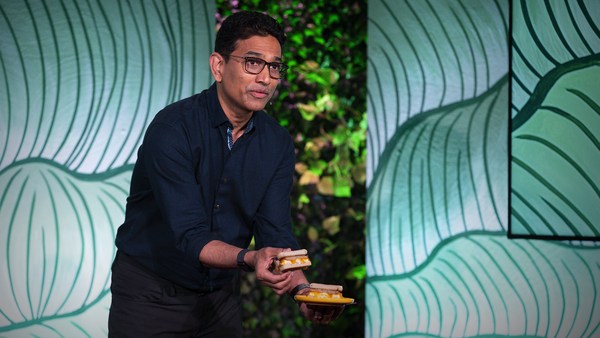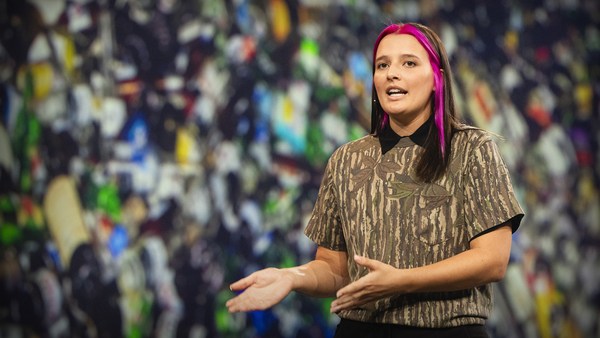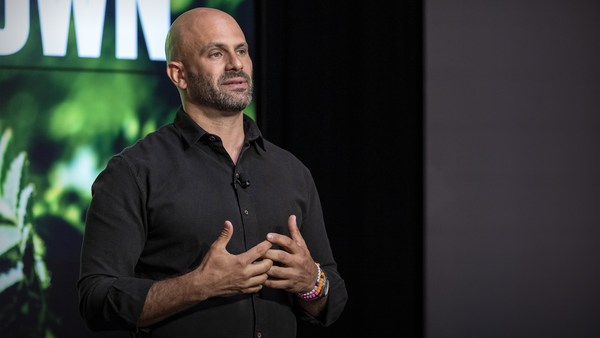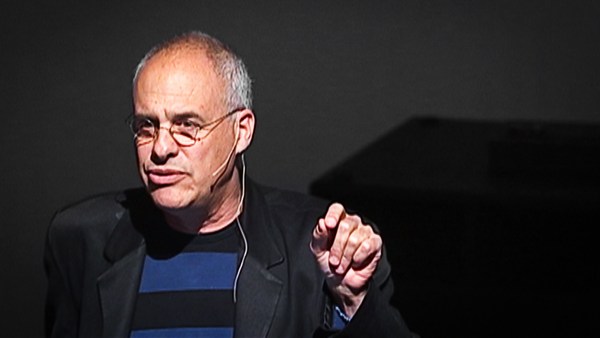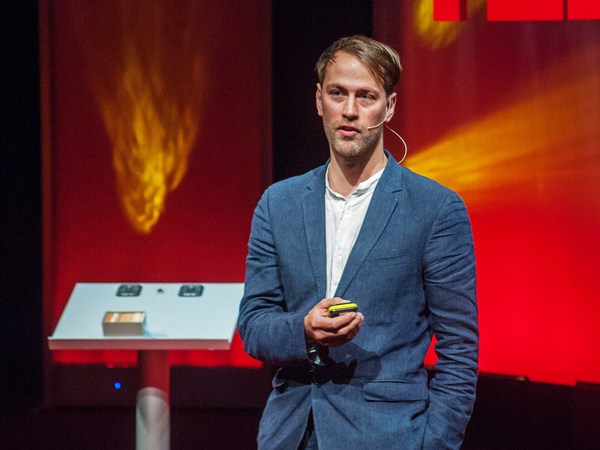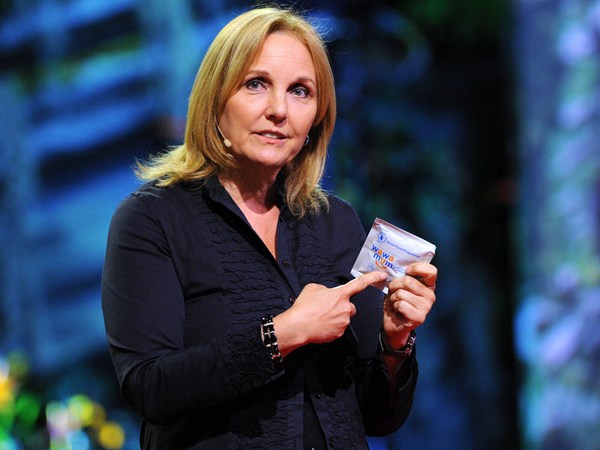My son thinks I have the coolest job title in the world. I'm the director of the future of food. For him, that's some kind of idea -- he thinks this is a Willy Wonka-style role of creating chocolate fountains, unlimited gobstoppers. But it’s a little bit more down to Earth, really. It's about thinking about how do we produce food without destroying nature? How do we deliver to 10 billion people affordable, nutritious and sustainable food?
The one catch to all of this is I can't tell anyone what they should eat. It just doesn't work, right? I tell my son all the time what he shouldn’t eat, and that doesn't work. My mom spent, you know, my early days constantly telling me what I should eat. Brussels sprouts.
(Laughter)
This is me just last week. It didn't work despite all the time she told me. So anyway, I digress, that's the one catch.
But when I do think about the future of food and how to produce food without destroying nature, one particular molecule always floats to the top as a priority. And that's protein. It's essential to human life. Did you know we have 100,000 different types of protein in our own bodies, right? When I say protein as well, it's kind of writ large. All of the good stuff we get from animal-sourced foods, from meat and from milk, macronutrients and micronutrients. But our insatiable appetite for protein is destroying nature. Did you know that one third of global emissions come from food? And half of that is coming from animal agriculture. Did you know that we have 40 percent of the land surface dedicated to production of agriculture? And over two thirds of that is for animal agriculture. And it doesn't stop there. We project to 2050 an increase in demand for animal-sourced foods and protein of 50 percent or more. There's simply no way that we can deliver that without tearing up planet Earth. Unless we change the way we think about it.
And so one thing that I think can play an important role in that is alternative proteins. So when we talk about alternative proteins, we can think about plant-based products. Plant-based could be burger made from soybeans. It could be bacon rashers made from peas. And there are already products like this on the market. And they come in at an extraordinarily lower footprint in terms of emissions and in terms of land.
We can also think about fermentation. So fermentation, it's an age-old practice that we've had for millennia. Today, modern-day fermented products, we can be using microalgae and microbes and fungi and creating new types of protein. Hell, we can even create protein from air.
And then the other type is cultivated meat. Cultivated meat is where we use cells from animals, reproduce them, we recreate tissues, and we have meat-like products that are coming from just these cells, right? I had the fortune to try beef steak recently. It had the taste, it had the texture, it smelt. It was meat, right? This is me trying it.
(Laughter)
As you can see, there's a trend in this. I’m going to be the only TED Talk to show only slides of me eating things. And as you can see, it's very hard to get a good photo while you're tasting. Fortunately, this will be the last one. But the mind-blowing thing, while you're tasting that, is thinking that the cow, where those cells came from, was grazing up on the mountainside, just close to where I was. And that cow, those cells could produce thousands, if not millions of those kinds of steaks. It's mind-blowing.
So it sounds too good to be true, right? It's not perfect, it has its issues. So many of the plant-based proteins that we're producing right now are being processed too much. They're over-processed. Also on cultivated meat, the costs are very high. We have 40 dollars per pound or more is the cost of producing these kinds of proteins from cultivated meat. And then scaling this to have any kind of planetary impact, to actually producing cultivated meat on planetary scales, it's an enormous challenge.
The sector is also suffering. We had an absolute influx of of funds, of investment during the pandemic. And the sector right now is suffering. That was impatient capital, venture capital seeing, pouncing on a great idea. But right now it's looking for products on shelves and profits to pay back those investments. The sector is suffering.
So ... Is it really part of this future of food? Well, put simply, I think it has to be. We have to make this work. And many of these problems are surmountable. Innovation is absolutely key. We can bring down the prices of cultivated meat through innovation. We can find new ways of combining plant proteins and recreating, mimicking the flavor of meat, the flavor of milk, the textures. If we get those ingredients right and those combinations right. AI is helping tremendously. I've tasted a cheese that is cheese. I love cheese, and this cheese is cheese. And it's using AI to get those combinations right. So these problems are surmountable.
So remember the catch. I can't tell anyone what to eat. But what can I do? Well, I can tell governments that they need to step up on this. We need governments to step up and support. Did you know that hundreds of billions of dollars are spent every year for subsidies for support to animal agriculture? And I can tell you -- and that’s on the rise. But I can tell you, if you had the same amount of support going to the alternative-protein sector, these products would already be an awful lot more affordable and much tastier on supermarket shelves. So governments need to step up. They need to level the playing field for this, right? And many governments are interested. They see opportunity here. It's resilience. It's building, it's addressing food prices, it's addressing food security. But they're scared to talk about this. This has become a polarized issue. It needs to not be.
And governments looking at this can look for Singapore for inspiration. Singapore has been a powerhouse in alternative proteins. What did they do? They were the first to regulate for cultivated meat. They regulated, made it available for consumers. They invested in innovation. They invested in science. They incubated companies and start-ups. They created an ecosystem of actors working on alternative proteins that is world-class. And it's the only country in the world where you can go to a supermarket and buy a cultivated-meat product today. It is there on supermarket shelves. Singapore has shown the way of how this can be done.
And the other thing that I can do is invest. I can put our money where our mouth is. So at the Bezos Earth Fund, we've just committed 100 million dollars to support centers for sustainable protein. It is tackling some of these insurmountable problems, these surmountable problems, using innovation to bring prices down, to improve texture, to improve taste and to make these more healthy and more nutritious for people. That's what I can do.
What can we do? Well, we need to recognize that everyone has a role to play in this future of food. Everyone has a stake. Not that kind of steak. We need to move away from "either-or" and move towards "yes and." Yes, we need rotational grazing, regenerative animal agriculture ranches that are delivering all of the great things that they do. And we need plant-based proteins. Yes, we need lab-grown, cultivated meat. And for fish, for lamb, for beef. And we need new fermented products. Yes, we need all of that and everything in between. Whole grains, pulses. Yes, we need that. right?
So that's how I imagine the future of food. It's one that accommodates for all of the palates, the religions, the cultures, the preferences out there, and all of the budgets. And it's not about just producing the perfect burger. A Nigerian came up to me and he said, "Look, don't come to me with burgers in Nigeria. We're not a burger nation. We like chewy beef." Yes, it's chewy beef. And it's halal-certified lamb and it's all of these things. So that way, and my son is very grateful for this, we're not telling anyone what to eat. We are simply getting access to a large range of options which are all sustainable, affordable and healthy.
And so it's ultimately about choice. It's about my choice. It's about your choice. It's everyone's choice. But make no mistake, these are probably some of the most important choices we'll make.
Thank you.
(Applause)
